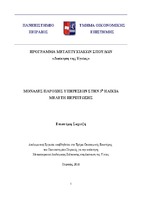Μονάδες φροντίδας ηλικιωμένων : μελέτη περίπτωσης
Elderly care units and senior's care : case study

View/
Keywords
Τρίτη ηλικία ; Δημογραφική γήρανση ; Φροντίδα ηλικιωμένων ; Οίκοι ευγηρίας ; Μονάδες φροντίδας ηλικιωμένων ; Elderly people ; Population ageing ; Senior care ; Nursing home ; Private elderly care unitAbstract
The aim of the present thesis is to document the emergence and operation of elderly
care units, as a response to the phenomenon of increasing life expectancy. Drawing on
evidence from Europe and Greece, a wider picture of senior care is sketched, aiming to
set the scene within which private initiatives transpire. Τhe thesis includes a historical
recount of senior citizenship along with the significance of health and quality of life.
Following this, European demographic indices are analysed as evidence of the everincreasing
need to provide senior care services, at public and private level. A more
thorough look is cast on European platforms that have emerged at private and nongovernmental
level, tackling issues of social security and inclusion, senior benefits,
nursing and care, among others.
Following that, the thesis narrows its geographic focus on Greece, starting with the
functioning of public structure as a response to the problems faced by elderly people.
The rest of the paper focuses exclusively on private organisations providing senior care
services, a section introduced by an overview of the legislative and institutional
framework underpinning their creation and operation. The national macro-environment
is, consequently unfolded via the PEST-DG and Porter analyses.
Lastly, a case-study is conducted to zoom- in the structure and strategy choices of a
leading organisation in the provision of elderly care services, MAREPI. The purpose of
the case-study is to describe the specific experiences of an elderly care unit, operating in
the Greek setting and evaluate its contribution at raising senior care standards and
quality of life, at both individual and societal level. In order to achieve this, a review of
the mission, vision and goals of the organisation is made, along with a thorough
description of its structure (flow chart) and role-specific duties of its admin, medical,
nursing, and support staff. Further adding to this, reference to the clientele of MAREPI
is made, along with investment decisions on infrastructure and equipment. A SWOT analysis finally sheds some light on the micro-environment within which MAREPI
operates. Lastly, reflections are made on the potential of amelioration of MAREPI’s
elderly care services and enhancement of its competitive position, via suggestions to its
strategic considerations, such as boost its market share, reconfiguring its target group
and investing on innovations-generating activities.


